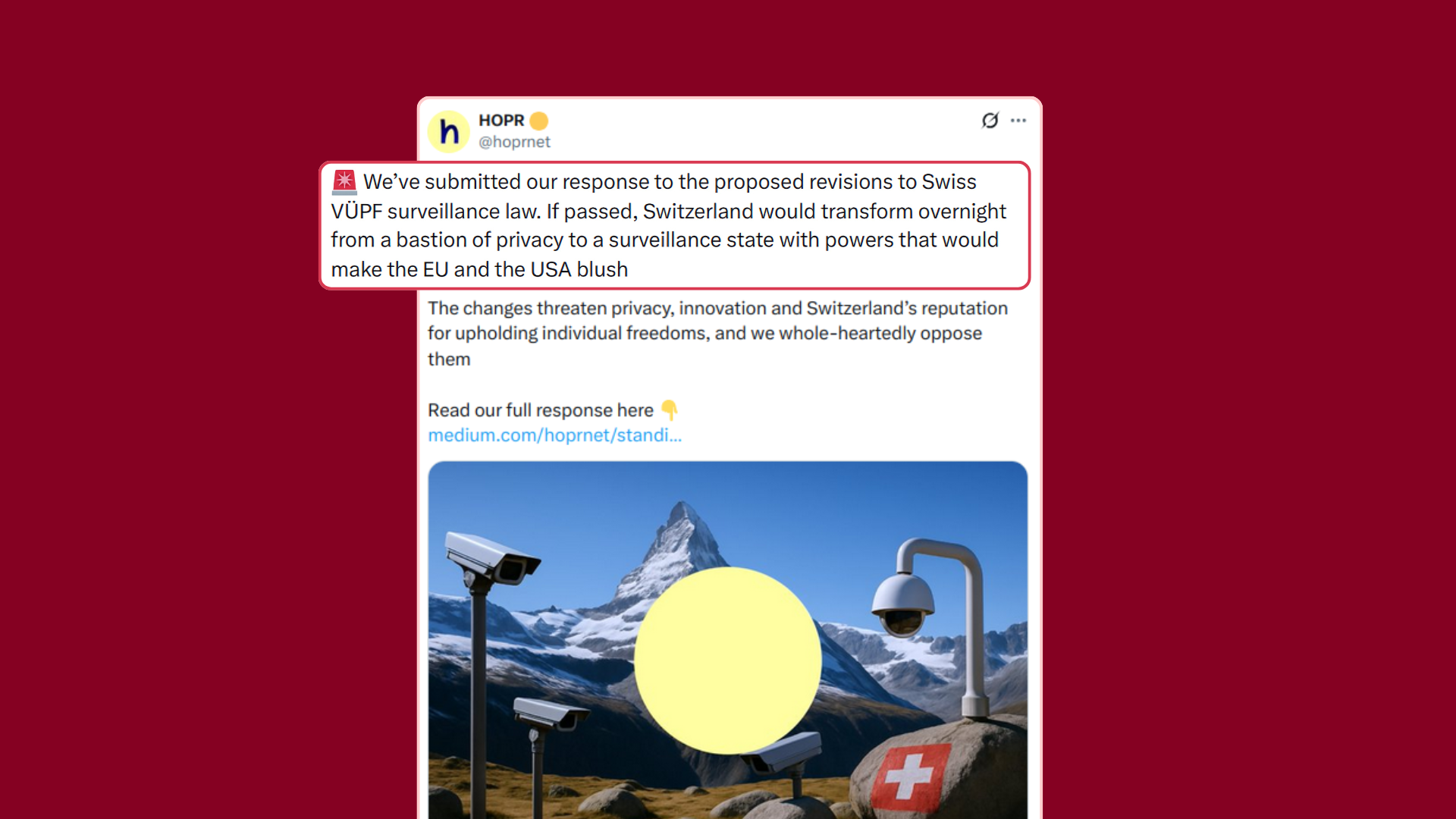Switzerland plans surveillance worse than US
-
It's still an old nation-state with laws made in the olden day when you had to compromise.
What democracy does not rely on compromise?
None. I'm using "compromise" here in the sense of compromising between democracy and elites, with the world order normal 200 years ago. Today those compromises don't work because of technological progress and different makeup of societies.
Just like those in the USA.
-
This would be catastrophic to Proton AG
In their AI announcement yesterday they mentioned that they are moving to the EU because of legal protections.
-
So. Switzerland doesn't really have fully direct democracy in the necessary sense.
Yes, it's half-direct, who said otherwise? Fully direct on a Nation state level would maybe be possible now with the Internet.
But we can still overrule them, while germans get tired of their politicians lying on elections and doing what they want. Doesn't mean they don't try here.But yeah, this system has it's weaknesses with complicated or emotional topics. But then again, we are all humans.
Fully direct on a Nation state level would maybe be possible now with the Internet.
That's my point. It might seem dangerous to rely on the Internet for such basic matters, but it's already being used to great effect to undermine all democracies. So there's no choice, it's like an arms race. (Still, probably for elections it'd make sense to have a countrywide parallel intranet, so that someone's error in setting up a BGP router wouldn't disrupt it.).
But yeah, this system has it’s weaknesses with complicated or emotional topics. But then again, we are all humans.
That's the other side of the problem - modern easiness of propaganda.
OK, I live in Russia, just rather sad to see how many other countries are slowly drifting in the same regrettable unsavory direction.
-
You've not heard of shady banking, Nazi gold, reluctance to stop dealing with Russia, women not being able to vote until the 70s, and Nestle?
Switzerland gets aggressively simped for online, and there's certainly some nice things about them, but there's also some pretty awful things.
I think someone like you, Grand Nagus, would admire the Swiss over most of that

-
This is not law yet. The Federal Council (the executive) has started a consultation process at the beginning of the year which ended in May. They are now looking at all the feedback that came in, that was - unsurprisingly - exclusively negative from all sides. If the responsible minister wants to go ahead with it, it goes to the Federal Council for a vote. If they approve it, this would be a decree to change an existing decree and that would come into effect next year or the year after.
And this is where direct democracy comes in: If this is the case anyone can start getting signatures for a public initiative which would change the constitution to prohibit such practices. In fact anyone can start doing that now. If it succeeds, then it'll come to a popular vote. Threema (a secure chat provider) has already announced that they would do that and I'm sure that they wouldn't be the only ones to band together in this.
The process might take long, but this is in no way "not good enough to counter a campaign for legal change with a goal" and in fact has happened multiple times in the past. Hence why Switzerland has a direct vote on issues every few months because of something called "Referendum", whereby a popular vote can be forced on an issue passing through parliament. I might have my criticisms of the political system, but this ain't it.
its system encourages it to have politicians as a thing
Well yes, there is some level of representation, so over 8 million people don't have to decide every little detail on 1000s of changes of law. The system is built upon a "milita" system. I.e. politicians usually have a job. So people have the possibility to vote in experts or their vicinity and know that they won't solely be career politicians. Unfortunately the laws around financing and propaganda are rather lax, giving an advantage to the rich, which leads to an over-representation of the capitalist class with occupations such as lawyers and business-owners and a clear under-representation of classical working-class jobs such as craftspeople or office workers. This is amendable though to correct the mismatch, if people realize their class interest and don't fall for the same right-wing propaganda of a party whose playbook has been inspired by the US GOP for decades and who is inspiring Germany's AfD now.
The main downside of the system imo has to do with people with no knowledge on an issue having to weigh in on them and therefore how powerful propaganda campaigns can be, which means that money buys power, as in every other existing so-called democracy - direct or not. Especially with how money shifts power away from the populace, this is inherent to capitalistic systems and it would be on the populace to protect itself from it. With enough propaganda though, people keep voting for more power of capital unbeknownst to them or not, just as they might vote against their interests on other things. The fact that you have to convince so many people, who hopefully do have some degree of education, makes it a lot harder though, for big capitalists to reach their goals, compared to less direct systems. And I know of several examples, how such a vote did not go in favor of big capital. What usually makes the difference is whether they succeed in portraying their advantage as the advantage of all.
Yeah, so the difference in what I'd like from what you describe as existing is:
The representation should be spread thinner over the population, and with separate organs voting on separate kinds of matters. Ideally so that most of the population would have some short experience in participating in at least one of those organs by reaching the age of 30. Experience is needed to make your last paragraph less problematic, and wide participation - to gain that experience first-hand and also to make it very expensive to blackmail\bribe\threaten enough people. This might also make a referendum an event a bit more rare, because it won't come to that.
In general it's very cool that such a system even exists as a proof that nothing is impractical about it.
-
You've not heard of shady banking, Nazi gold, reluctance to stop dealing with Russia, women not being able to vote until the 70s, and Nestle?
Switzerland gets aggressively simped for online, and there's certainly some nice things about them, but there's also some pretty awful things.
Those are all very bad, but on the other hand their flag is a big plus.
-
Yeah, so the difference in what I'd like from what you describe as existing is:
The representation should be spread thinner over the population, and with separate organs voting on separate kinds of matters. Ideally so that most of the population would have some short experience in participating in at least one of those organs by reaching the age of 30. Experience is needed to make your last paragraph less problematic, and wide participation - to gain that experience first-hand and also to make it very expensive to blackmail\bribe\threaten enough people. This might also make a referendum an event a bit more rare, because it won't come to that.
In general it's very cool that such a system even exists as a proof that nothing is impractical about it.
There do exist things resembling that a bit. Usually done on the local level and mostly concerning some street/development design, where people are invited to actively participate in a workshop style event with experts and vote on the results. But yes, these are not mandates. And as soon as you go onto the state or federal level, such structures become virtually non-existent.
The others are parliamentary commissions which can be instated by parliament and are formed of mainly external experts around a certain issue. These are often used on state and federal levels of government.
I would love if representation was spread wider over the population and that involvement was higher. I also am baffled at how bad general civics education is here in school, especially at the obligatory level. I would welcome a far more detailed and engaging civics education where they could already get some experience right at the school. Or go and participate at some local event. This way they also see the importance of a truly democratic process. Alas, as long as they can't vote, nobody seems to want their opinions.
Another part that needs addressing is finances. There's a lot of intransparency yes, but the way it works now, it is also very hard to get your message across without being big in a main political party or having some big private sponsor. Which limits your actual freedom before and after you're elected. If we're thinking radical we might severely limit campaign budgets or think about public funds allowing the same restrictive scope for everyone, no matter their background and finances. This would also limit the imbalance in outreach between capital-backed candidates and others.
A third huge problem lies within the judiciary, where judges on many levels effectively also have to be party-associated to get elected. If that sounds completely compromising their necessary impartiality, yeah, it's because it does. (Although I don't have data on how that influences their work)
And lastly: The structures of accountability for politicians. I know that some steadiness or stability is necessary, but without the fear of accountability, far too many misuse their positions without repercussions. As we see from around the world, this invites more and more brazen figures to do more and more brazen violations. Just a brain-fart: 100k signatures to force a vote on relieving someone of their immunity so they can be tried in court. And to not just wait it out. Right now, it's parliament that has this exclusive possibility.
-
You've not heard of shady banking, Nazi gold, reluctance to stop dealing with Russia, women not being able to vote until the 70s, and Nestle?
Switzerland gets aggressively simped for online, and there's certainly some nice things about them, but there's also some pretty awful things.
Yeah, the whole "private banking" history thing the EFF seems to lionize in the article was 100% just for serving lucrative international robber barrons and other criminals. It was never about protecting regular citizens privacy.
-
You've not heard of shady banking, Nazi gold, reluctance to stop dealing with Russia, women not being able to vote until the 70s, and Nestle?
Switzerland gets aggressively simped for online, and there's certainly some nice things about them, but there's also some pretty awful things.
Reluctance to stop dealing with Russia is a single positive in the list.
-
Those are all very bad, but on the other hand their flag is a big plus.
It's also a big red flag.
-
The proposed update to Switzerland’s Ordinance on the Surveillance of Postal and Telecommunications Traffic (VÜPF: Verordnung über die Überwachung des Post- und Fernmeldeverkehrs) represents a significant expansion of state surveillance powers, worse than the surveillance powers of the USA.** If enacted, it would have serious consequences for encrypted services such as Threema, an encrypted WhatsApp alternative and Proton Mail as well as VPN providers based in Switzerland.**

Switzerland plans surveillance worse than US | Tuta
Revision of Swiss surveillance law VÜPF would directly target VPN & encrypted chat and email providers based in Switzerland.

Tuta (tuta.com)
Ah, yes. The country that formerly let you have anonymous secret bank accounts.
-
Those are all very bad, but on the other hand their flag is a big plus.
But on the minus side, it's a cross
-
The proposed update to Switzerland’s Ordinance on the Surveillance of Postal and Telecommunications Traffic (VÜPF: Verordnung über die Überwachung des Post- und Fernmeldeverkehrs) represents a significant expansion of state surveillance powers, worse than the surveillance powers of the USA.** If enacted, it would have serious consequences for encrypted services such as Threema, an encrypted WhatsApp alternative and Proton Mail as well as VPN providers based in Switzerland.**

Switzerland plans surveillance worse than US | Tuta
Revision of Swiss surveillance law VÜPF would directly target VPN & encrypted chat and email providers based in Switzerland.

Tuta (tuta.com)
Hahahahahahahahahahahahahahahahaha
Everything goes to shit.
Hahahahahahahahahahahahahahahahaha
Switch to Proton Switch to Proton Switch to Proton Switch to Proton Switch to Proton Switch to Proton
Hahahahahahahahahahahahahahahahaha
Its always the next thing, and the next thing and the next thing. What's the new proton everyone will annoy the fuck out of us with?
This is why I stopped giving a shit. Actually. I do give a shit. I will let them surveil all of my shits, and garbage, and vomit.
-
The proposed update to Switzerland’s Ordinance on the Surveillance of Postal and Telecommunications Traffic (VÜPF: Verordnung über die Überwachung des Post- und Fernmeldeverkehrs) represents a significant expansion of state surveillance powers, worse than the surveillance powers of the USA.** If enacted, it would have serious consequences for encrypted services such as Threema, an encrypted WhatsApp alternative and Proton Mail as well as VPN providers based in Switzerland.**

Switzerland plans surveillance worse than US | Tuta
Revision of Swiss surveillance law VÜPF would directly target VPN & encrypted chat and email providers based in Switzerland.

Tuta (tuta.com)
I know this and i know that political systems in Switzerland are really unique. I think this kind of thing can pass despite the robust involvement of the civil society, mostly because it's an update on a preexisting law. But this is something I can't tell as of now.
-
You've not heard of shady banking, Nazi gold, reluctance to stop dealing with Russia, women not being able to vote until the 70s, and Nestle?
Switzerland gets aggressively simped for online, and there's certainly some nice things about them, but there's also some pretty awful things.
My theory is that if you're cute you're socially protected and the same applies to states and countries. Switzerland is quite the nice place and there are cultural hubs of historical importance, so it has the cute look now doesn't it.
-
You've not heard of shady banking, Nazi gold, reluctance to stop dealing with Russia, women not being able to vote until the 70s, and Nestle?
Switzerland gets aggressively simped for online, and there's certainly some nice things about them, but there's also some pretty awful things.
Hold up now! I'll have you know in some parts of the country women couldn't vote until the 90s! Also unmarried cohabitation was illegal in some cantons until the 80s and paternity leave as a concept only exists in Switzerland since the 00s.
-
The proposed update to Switzerland’s Ordinance on the Surveillance of Postal and Telecommunications Traffic (VÜPF: Verordnung über die Überwachung des Post- und Fernmeldeverkehrs) represents a significant expansion of state surveillance powers, worse than the surveillance powers of the USA.** If enacted, it would have serious consequences for encrypted services such as Threema, an encrypted WhatsApp alternative and Proton Mail as well as VPN providers based in Switzerland.**

Switzerland plans surveillance worse than US | Tuta
Revision of Swiss surveillance law VÜPF would directly target VPN & encrypted chat and email providers based in Switzerland.

Tuta (tuta.com)
Considering that we might have a World War III or 2nd American Civil War in a decade or two, it would be foolish of Switzerland to not permit encrypted VPN. A stable neutrality is very profitable in a world of uncertainty.
-
The proposed update to Switzerland’s Ordinance on the Surveillance of Postal and Telecommunications Traffic (VÜPF: Verordnung über die Überwachung des Post- und Fernmeldeverkehrs) represents a significant expansion of state surveillance powers, worse than the surveillance powers of the USA.** If enacted, it would have serious consequences for encrypted services such as Threema, an encrypted WhatsApp alternative and Proton Mail as well as VPN providers based in Switzerland.**

Switzerland plans surveillance worse than US | Tuta
Revision of Swiss surveillance law VÜPF would directly target VPN & encrypted chat and email providers based in Switzerland.

Tuta (tuta.com)
Isnt Switzerland the country that struggled with their covid response because of the direct democracy requirements lacking provisions for such changes...amazing they can figure everything out to hurt the public.
-
Hahahahahahahahahahahahahahahahaha
Everything goes to shit.
Hahahahahahahahahahahahahahahahaha
Switch to Proton Switch to Proton Switch to Proton Switch to Proton Switch to Proton Switch to Proton
Hahahahahahahahahahahahahahahahaha
Its always the next thing, and the next thing and the next thing. What's the new proton everyone will annoy the fuck out of us with?
This is why I stopped giving a shit. Actually. I do give a shit. I will let them surveil all of my shits, and garbage, and vomit.
proton is currently moving their infrastructure out of switzerland because of this bullshit, so no reason to lose your cool
-
Ah, yes. The country that formerly let you have anonymous secret bank accounts.
You account is anonymous only if you have over a billion.
-
-
-
-
-
-
The Current System of Online Advertising has Been Ruled Illegal by The Belgian Court of Appeal. Advertising itself is Still Allowed, but not in a Way That Secretly Tracks Everyone’s Behavior.
Technology 1
1
-
-
Rebecca Shaw: I knew one day I’d have to watch powerful men burn the world down. But I didn't expect them to be such losers.
Technology 1
1


